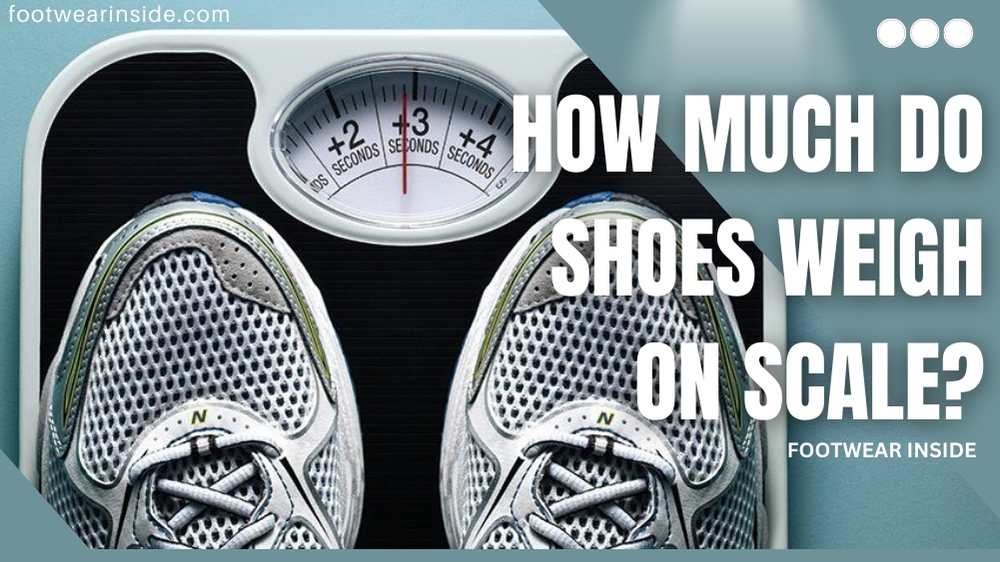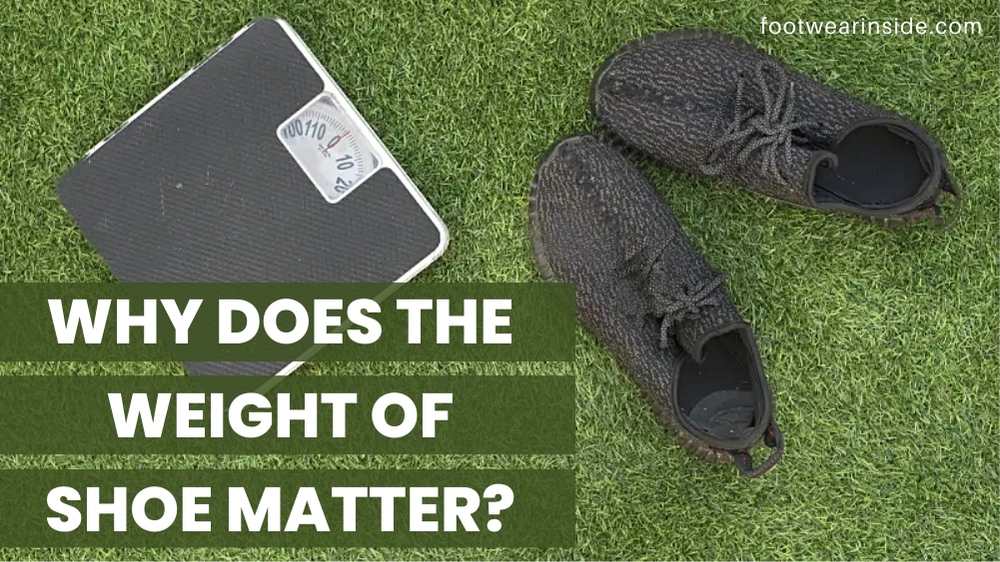How much do shoes weigh on scale? On average, pair of shoes weighs around o.5 to 3 lbs. Due to the shoe type, size, material, usability, and structure, shoe weight varies significantly.
When you’re on a marathon, a heavy shoe becomes hard to run miles and causes serious foot issues. Besides, flat and light shoes can’t distribute the body weight evenly while lifting weights. In short, shoe weight affects performance, comfort, and dealing with foot issues.
Confused about the weight of shoes on the scale? Go through our detailed guide to get clear of different shoes and the impact of weight on comfort & performance.
Shoe Weight Comparison Table
| Shoe Type | Weight Range |
|---|---|
| Regular Shoes (Men) | 1 to 2 lbs |
| Regular Shoes (Women) | 0.5 to 1 lb |
| Running Shoes | o.5 to 1 lb |
| Walking Shoes | 0.3 to 1.5 lbs |
| Working Shoes | 2 to 5 lbs |
| Standing Shoes | 0.5 to 1 lb |
| Trekking Shoes | 2 to 3 lbs |
| Sports Shoes | 0.5 to 2 lbs |
How Much Do Shoes Weigh On Scale?
Depending on the shoe type, size, material, usability, structure, and quality, a shoe weighs 0.3 to 5 lbs on the scale. Let’s have a look at the weight of different shoes in detail.

Regular Shoes
Spending hours in regular shoes become comfortable if you pick the right one. Usually, men’s dress shoes weigh 1 to 2 lbs to maintain the comfort and flexibility of daily work.
On the other hand, the women’s regular shoes weigh only 0.5 to 1 lb due to the slim design. If you prefer designer flat shoes for special occasions, they may weigh less than traditional ones. But, the weight of both men’s & women’s dress shoes varies with style & feet size.
Running Shoes
According to size and design, running shoes usually weigh o.5 to 1 lb on the scale.
While running on track or street, most people prefer lightweight running shoes to reduce fatigue issues and increase speed. In fact, PodiumRunner is pretty confident that light running shoes weighing less than 0.5 lbs can help in support & performance.
On the other hand, heavier running shoes come with better cushioning, even on rough terrain. Moreover, these shoes can go up to 0.8 to 1 lb, which gives stability and offers less fatigue. If you’re dealing with rugged terrain, a heavy running shoe can ensure injury protection and offer durability.
Walking Shoes
For comfortable & safe walking, walking shoes require less weight than regular ones. On average, a walking shoe can weigh 0.3 lbs to 1.5 lbs so that you can get maximum comfort and enjoy miles with comfort.
During a long day, a shoe must be light enough to offer a comfy walking experience. Otherwise, the weight of shoes can cause serious foot issues. But, some people prefer medium-weight walking shoes to ensure stability and proper cushioning on rugged terrain. Still, the weight can pressure off the feet while walking for long hours.
Working Shoes
Different types of work shoes are used considering the type of work & risk. In fact, a regular work boot can weigh only 2 lbs, whereas a steel-toe shoe can go up to 5 lbs.
When you’re working in a restaurant or hospital, shoes need to be light and slip-resistant. Also, handling a 10-12 hour shift requires maximum comfort to keep feet healthy and safe.
If you’re dealing with construction work, then a steel-toe boot is a must. Due to the weight of the steel toe, construction boots weigh 3 to 5 lbs. Sagor states that the few latest composite toe designs weigh 25-30% less than metal ones. In short, these working boots weigh only 2-3 lbs which can reduce worker leg fatigue and keep feet safe from serious injuries.
Standing Shoes
Though cushion prioritizes the most in standing shoes, the weight also matters a lot for standing in long shifts. Standing shoes generally weigh 0.5 to 1 lb, depending on the cushioning and footbed.
Few latest standing shoes include advanced cushioning tech that minimizes the weight but won’t compromise comfort. That’s why always pick a light & cushioned shoe to stand comfortably all day.
Trekking Shoes
Trekking or hiking shoes require support & durability while dealing with rugged and mesas terrain. But, the weight matters a lot to keep feet comfortable during hours of walking.
Usually, trekking or hiking shoes weigh around 2 lbs to 3 lbs which can provide enough support on any terrain. But, these shoes take a little time to break in and ensure comfy feelings. As a result, we suggest using these shoes for a few days before planning a hiking trip.
On the other hand, a few hiking boots only weigh 1 to 1.5 lbs due to composite material build-up. Still, lightweight shoes can’t offer enough durability in extreme terrain and longer runs.
Sports Shoes
According to the sporting and physical activities, the weight of a sports shoe differs a lot. From Quora, the weight of running shoes is o.5 to 1 lb on the scale, whereas the weight of lifting or training shoes can weigh 1 to 2 lbs.
While running on tracks, lightweight shoes can reduce fatigue issues and increase speed, cushioning, and support. On the other hand, heavier-lifting shoes come with thick, wide, square-edged, and hard soles. As a result, these shoes can create a stable base to ensure injury protection.
Weight Relation With Size & Types
Due to the material and construction, shoes’ weight increases with the size. Besides, multiple designs and types of shoes also make a difference in the weight. Let’s have a look at these shoes in detail.
Lightweight Shoes
Though the shoe size matters with age and body shape, small shoes come with less weight than regular ones. According to Footfaq, small-size shoes only weigh 0.4 to 0.6 lbs. Besides, if you wear designer flat shoes for special occasions, they will weigh less than traditional ones.
Medium Ones
Running to training shoes, most sports shoes weigh 0.5 to 1 lb to ensure enough support, cushioning, and comfort. In fact, the less weight of shoes can reduce fatigue issues and increase speed while on track. Still, the weight depends on the cushioned footbed and specialized outsoles.
Heavyweight
Shoe weight increase with the use of metal toes, heavy outsole, and rigid upper materials. Due to the use of steel toes on construction boots, these shoes weigh around 3 to 5 lbs. Also, shoes used in weight lifting can weigh up to 2 lbs to offer a stable base for lifters and ensure injury protection.
Why Does The Weight Of Shoe Matter?
Shoes’ weight matters for various factors, including better performance, comfort, travel considerations, and health concerns. Let’s talk about these factors in detail.

Better Performance
According to the lifestylesupremo, shoe weight matters for better performance, especially for athletes. Similarly, heavyweight shoes require more energy to move, which can slow down or tire the athletes.
On the other hand, lighter shoes are great for leaping and sprinting. In short, a lightweight shoe improves running efficiency as it requires less energy expended on the track. Also, these shoes allow the runner to run faster for hours in a marathon.
More Comfort
Shoe weight is one of the essential things when looking for more comfort. Aside from this, the perfect weighted shoes reduce fatigue and keep feet healthy. Moreover, lighter shoes offer good flexibility and allow natural movement. Again, proper-weight shoes enhance the comfort of prolonged walking.
On the contrary, shoe weight also matters for breathability as lightweight allows better air circulation and reduces heat and moisture buildup. Besides, these shoes prevent overheating feet and sweating to keep you calm on the road.
Travel Considerations
When travelers explore new places, they need comfortable shoes to keep their feet relaxed. In this case, heavy shoes can cause discomfort and make the travelers tired in a short time. Again, the heavy shoes make the traveling hours more challenging or risky.
Also, heavy shoes can take up more space and add extra weight to the traveler’s luggage. On the other hand, supportive and comfortable shoes are necessary to fit the terrain for walking, jogging, or hiking. Depending on the travel plans, consider the type of shoes that suits the trip.
Health Concerns
In some cases, the shoes’ weight can be a health concern. Heavy shoes put extra pressure on the body, especially the feet and ankles. As a result, these shoes can cause extreme muscle pain.
From the Cfac, heavy shoes require more energy during physical activities. In fact, these shoes put more stress on the cardiovascular system and affect heart rate and general toleration. But lightweight shoes are comfortable and less stressful for the body. Thus, it is better to take suggestions from a podiatrist about the perfect pair of shoes to keep feet safe and healthy.
How To Choose The Perfect-Weight Shoe
Selecting the perfect-weight shoe depends on various things, including the purpose of buying, body weight, and special care. Let’s look at these practical ways to pick a perfect shoe right now!

Purpose Of Buying
First, decide the buying purpose of the shoe. It means determining the use and why you are going to wear them. Is the goal for walking, running, jogging, or playing sports? Or, It’s for regular use or a fashion week?
As shoes vary from purpose to purpose, users can choose the desirable one according to their uses.
Consider Body Weight
While picking the right shoes, weight and body structure impact size and design. We suggest picking more cushioned and supportive shoes if your body is comparatively heavy. But if you’re skinny, always go for lightweight shoes. An Intermediate A2 shoe provides maximum cushioning but only weighs 200 to 300g.
Balance Flexibility And Cushioning
Before choosing the perfect-weighted shoes, consider the flexibility and cushioning depending upon the work or sport. In fact, lightweight shoes provide more flexibility and are suitable for running or jogging.
On the other hand, heavier shoes are durable and supportive to balance the body weight properly in activities like lifting and basketball.
Personal preference
Aside from flexibility and cushioning, your preference & personal comfort are the main thing in choosing a perfect-weight shoe. It is good to walk for a few minutes to understand whether the shoes are comfortable or not while buying.
Take Professional Advice
If you have any foot issues, always take a podiatrist’s advice before picking any shoes. Besides, a shoe expert or podiatrist can suggest how much weight or what type of shoes suit you. Also, they can recommend the proper shoe weight according to your feet.
FAQs
How Much Weight Can A Shoe Add?
Usually, the weight depends on the type of shoe, which can add 0.3 lbs to 5 lbs. In fact, a running or walking shoe adds only 0.3 to 1 lb, whereas a steel-toe working boot can add up to 3 to 5 lbs.
Does Shoe Weight Really Matter?
Yes, shoe weight matters in performance, comfort, and support. In fact, a lightweight shoe improves running efficiency on the track. On the other hand, heavy shoes offer more stability and ensure injury protection.
How Much Does A Shoe Affect Weight on a Scale?
According to the type of shoes, a shoe can add 0.3 lbs to 5 lbs on a scale. Due to the added weight, you won’t get an accurate reading on the scale. That’s why always take off your shoes before taking the reading.
Why Are Lightweight Shoes Good?
Lightweight shoes are good as it requires less energy expended on the track and improves running efficiency. As a result, these shoes are great for sprinting and marathons.
Final Thoughts
Let’s warp up our detailed guide. The shoe’s weight can vary depending on the size, material, type, and style. Even a pair of running shoes are heavier than a pair of flat shoes. In fact, shoe weight matters a lot in performance, comfort, and dealing with foot issues.
Also, keep sure the weight of the shoe won’t cause discomfort or any foot issues while spending hours. So, pick a pair of perfect-weight footwear and enjoy walking hours comfortably!




